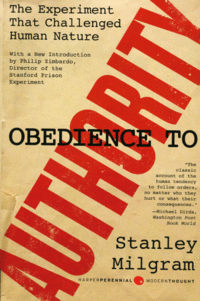- Obedience to Authority: An Experimental View
-
Obedience to Authority: An Experimental View 
2009 CoverAuthor(s) Stanley Milgram Country USA Language English Subject(s) Psychology, Social Psychology, Sociology - Social Theory, Authority, Obedience Publisher Harper & Row Publication date 1974 Media type Print (Hardback and Paperback) Pages 219 ISBN ISBN 0-422-74580-4 Between 1961 and 1962 Stanley Milgram carried out a series of experiments in which human subjects supposedly were given progressively more painful electro-shocks in a careful calibrated series to determine to what extent people will obey orders even when they knew them to be painful and immoral -to determine how people will obey authority regardless of consequences. These experiments came under heavy criticism at the time but have ultimately been vindicated by the scientific community. This book is Milgram′s explanation of his methods.
Stanley Milgram's experiments on obedience to authority are among the most important psychological studies of this century. Perhaps because of the enduring significance of the findings -the surprising ease with which ordinary persons can be commanded to act destructively against an innocent individual by a legitimate authority -it continues to claim the attention of psychologists and other social scientists, as well as the general public. This study continues to inspire valuable research and analysis.
Contents
About the Author
Stanley Milgram taught social psychology at Yale and Harvard Universities before becoming a "Distinguished Professor" at the Graduate Center of the City University of New York. He received several honors and awards, including a Ford Foundation Fellowship, an American Association for the Advancement of Science Socio-Psychological Prize, and a Guggenheim Fellowship. He died in 1984 at the age of fifty-one.
Contents
- Preface
- Acknowledgments
- The Dilemma of Obedience
- Methodology of Inquiry
- Expected Behavior
- Closeness of the Victim
- Individuals confront authority
- Further Variations and Control
- Individuals confront authority II
- Role permutations
- Group Effects
- Why Obedience- an analysis
- The process of Obedience: Applying the Analysis to the Experiment
- Strain and Disobedience
- An alternative Theory: Is Aggression the Key?
- Problems of Method
- Epilogue
- Appendix I: Problems of Ethic in Research.
- Appendix II: Patterns among individuals.
Experiments
Editions
- Milgram, S., Obedience to Authority: An Experimental View, Harper Perennial Modern Classics; Reprint edition (June 30, 2009) Paperback: 256 pages ISBN-10: 006176521X ISBN-13: 978-0061765216
- Milgram, S., Obedience to Authority: An Experimental View, Pinter & Martin Ltd.; New edition edition (17 Jan 2005) Paperback: 240 pages ISBN-10: 0953096475 ISBN-13: 978-0953096473
- Milgram, S. (1974), Obedience to Authority: An Experimental View, London: Tavistock Publications.
Reception
Background and historical context
Prologues
Epilogues
See also
References
Categories:- Psychology books
- 1974 books
Wikimedia Foundation. 2010.
